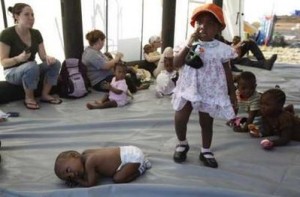Following the catastrophic earthquake in Haiti, 10 American Baptists from the Central Valley and East Side Baptist Churches in Idaho were arrested Jan. 29 after attempting to take 33 children, varying in age from 2 months to 12 years old, out of the ravaged country without consent from the government or documentation for what they proposed was the “Orphan Rescue Mission.” So far, each American has been charged with kidnapping, which could culminate in a 5 to 15 year sentence, and criminal association, which could lead anywhere from 3 to 9 years in prison. With Haiti’s long history of child trafficking plight, suspicions about the church group’s true intentions and skepticism regarding its claim of acting in good faith have surfaced.

According to the group, the idea was to establish a beach resort in the Dominican Republic as a haven for Haitian and Dominican orphans and take the children there. Nevertheless, some of the children did, indeed, have living parents who were consequently told that their kids were departing the earthquake aftermath for a “holiday” and were promised better lives. Residents from Callebas told The Associated Press that the church group also promised education for the kids and regular family visits to which they agreed because they couldn’t provide basic necessities for their own children. Despite these accounts, a reverend from Idaho, Clint Henry, adamantly denies trafficking allegations. In fact, he says that the church group was simply using Christianity as a means of saving the children, “One of the reasons that our church wanted to help is because we believe that Christ has asked us to take the gospel of Jesus Christ to the whole world, and that includes children.” He called the earthquake a signal to act with haste. Laura Silsby, spokesperson for the group, denied paying for the children, “In this chaos the government is in right now, we were just trying to do the right thing. By no means are we any part of [child trafficking]. That’s exactly what we are trying to combat.”
While the church group has insisted on acting purely in good faith, its poor familiarity with Haiti and global relief work as well as adoption policies has forced the issue of honest intentions versus selfish ulterior motives. As many as 380, 000 children were orphans before the massive earthquake hit Haiti, yet erroneous labels on orphans, especially with the intense aftermath, may spark an increase. Still, Haiti has secured the delay of adoptions to ward off a rise in child trafficking. With the recent “rescue mission,” Haitian Prime Minister Max Bellerive has instated a policy that requires that no child leave Haiti without his personal authorization. He has also spoken in support of the church group’s prosecution in the U.S. since the judicial system in Haiti is completely demolished although, because the children did not actually cross an international border, it may be improbable. While this unclear motive has posed a threat as well as a diversion to Haiti’s progression and effort in providing basic needs for the people, the children are currently safe in SOS Children’s Village in the capital, Port-au-Prince.







